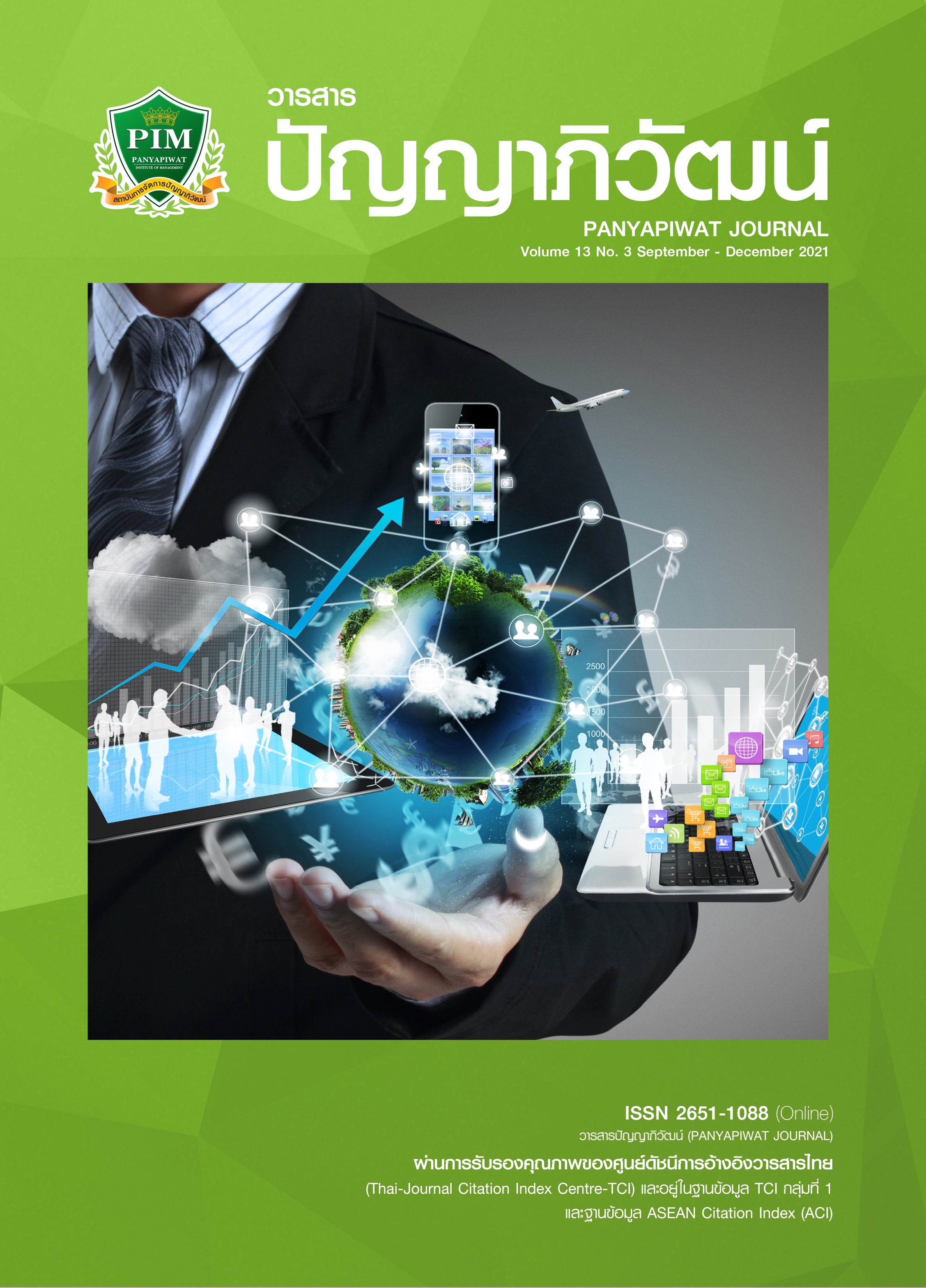กระบวนการพัฒนาข้าวอัตลักษณ์ลำาปางโดยการสร้างเสริมพลังการเรียนรู้เกษตรกร (ชาวนาอัจฉริยะ) ผ่านการวิจัยเชิงปฏิบัติการแบบมีส่วนร่วม
Main Article Content
บทคัดย่อ
การวิจัยเชิงปฏิบัติการแบบมีส่วนร่วมนี้มีวัตถุประสงค์เพื่อพัฒนากระบวนการสร้างเสริมพลังการแลกเปลี่ยนเรียนรู้ และความเชื่อมโยงตลอดโซ่อุปทานในการพัฒนาข้าวสายน้ำแร่แจ้ซ้อนสู่ข้าวอัตลักษณ์ลำปาง ประชากร คือ สมาชิกของกลุ่มวิสาหกิจชุมชนเกษตรปลอดภัยไร้สารเคมีตำบลแจ้ซ้อน จำานวน 30 ราย ด้วยกระบวนการเรียนรู้แบบมีส่วนร่วมในการพัฒนา “ชาวนาอัจฉริยะ” ผ่านกระบวนการเรียนรู้ร่วมกันแบบบูรณาการระหว่างภาครัฐ เอกชน เกษตรกร และผู้ประกอบการ เพื่อเชื่อมโยงโซ่อุปทานตั้งแต่ต้นน้ำ กลางน้ำ และปลายน้ำ ผลการวิจัยคือ 1) เกิดแนวทางการพัฒนาสินค้าข้าวของกลุ่มชาวนาอัจฉริยะให้มีอัตลักษณ์เฉพาะ มีมาตรฐานการปลูกและแปรรูปที่ตามระบบการรับรองที่ปลอดภัย และมีข้อมูลสนับสนุนข้าวสายน้ำแร่แจ้ซ้อนให้เป็นสินค้า GI
ของจังหวัดลำปางหรือสินค้าในตลาด Niche Market 2) เกิดรูปแบบความร่วมมือระดับชุมชน ได้แก่ องค์กรปกครองส่วนท้องถิ่น ผู้นำชุมชน ปราชญ์ชุมชนด้านการปลูกข้าว กลุ่มเกษตรกร และกลุ่มผู้ประกอบการเพื่อแสวงหากลไกการขับเคลื่อนร่วมกันคือ การนำจุดแข็งมาพัฒนาเป็นจุดเด่นและเป็นหลักสำคัญในการดำเนินงาน3) การปฏิบัติการประยุกต์ใช้องค์ความรู้จากการแลกเปลี่ยนเรียนรู้เรื่องการปลูกข้าวของชุมชนสู่ขั้นตอนการพัฒนาการปลูกข้าวด้วยมาตรฐานกลุ่มภายใต้การรับรองเครื่องหมายมาตรฐานการผลิตที่ปลอดภัย 4) กระบวนการพัฒนาแบรนด์สินค้าข้าวของกลุ่มเกษตรกรให้มีอัตลักษณ์และเรื่องราวที่สะท้อนถึงภูมิปัญญาและจุดขายที่ชัดเจนสนองตอบต่อตลาดยุคดิจิทัล เพื่อสื่อสารเรื่องราวข้าวสายน้ำแร่แจ้ซ้อน โดยกระบวนการกลุ่มของเกษตรกรเป้าหมาย
Article Details
“ข้าพเจ้าและผู้เขียนร่วม (ถ้ามี) ขอรับรองว่า บทความที่เสนอมานี้ยังไม่เคยได้รับการตีพิมพ์และไม่ได้อยู่ระหว่างกระบวนการพิจารณาลงตีพิมพ์ในวารสารหรือแหล่งเผยแพร่อื่นใด ข้าพเจ้าและผู้เขียนร่วมยอมรับหลักเกณฑ์การพิจารณาต้นฉบับ ทั้งยินยอมให้กองบรรณาธิการมีสิทธิ์พิจารณาและตรวจแก้ต้นฉบับได้ตามที่เห็นสมควร พร้อมนี้ขอมอบลิขสิทธิ์บทความที่ได้รับการตีพิมพ์ให้แก่สถาบันการจัดการปัญญาภิวัฒน์หากมีการฟ้องร้องเรื่องการละเมิดลิขสิทธิ์เกี่ยวกับภาพ กราฟ ข้อความส่วนใดส่วนหนึ่งและ/หรือข้อคิดเห็นที่ปรากฏในบทความข้าพเจ้าและผู้เขียนร่วมยินยอมรับผิดชอบแต่เพียงฝ่ายเดียว”
เอกสารอ้างอิง
Brest, P. (2010). The Power of Theories of Change. Retrieved April 26, 2019, from http://sc4ccm.jsi.com/wp-content/uploads/2016/07/The-Power-Of-Theories-Of-Change.pdf
Chantharat, M. & Maikaensarn, V. (2019). Upstream Supply Chain Analysis of Sangyod Muang Phatthalung Rice Using Scor Model. Panyapiwat Journal, 11(1), 127-136. [in Thai]
Clark, H. & Taplin, D. (2012). Theory of Change Basics: A Primer on Theory of Change. New York: Acknowledge.
Damrongwattanakool, N., Thonglard, P., Janasak, S., Tikapanya, T., Chompoo, M., & Mesumree, J. (2018). Guidelines for Promoting Rice Exports in the Northern Region 1 (Research Report). Lampang: Lampang Province Commercial. [in Thai]
Kaoded. (2019). Chae Son National Park, Lampang Ranked in the Top Ten of the National Parks with the Most Tourists. Retrieved January 4, 2019, from https://today.line.me/th/article/%94-nYYJjg [in Thai]
Ketpirune, O. (2012). Persuasion in Planting Organic Rice with Research. Journal of Community Development Research, 5(1), 117-119.
Lampang Provincial Commercial Office. (2014). Mission. Retrieved April 6, 2020, from http://www.aecthaibiz.com/province/main.html?pv=52 [in Thai]
McDermott, R. & Archibald, D. (2010). Harnessing Your Staf’s Informal Networks. Harvard Business Review, 88(3), 82-89.
National Science and Technology Development Agency (NSTDA). (2017). Guidelines for Knowledge Management that Meet International Standards. Retrieved August 7, 2020, from https://nstda.or.th/th/nstda-knowledge/knowledge-management/12623-km-talk [in Thai]
Office of the Public Sector Development Commission and the National Productivity Institute. (2004). Knowledge Management from Theory to Practice. Bangkok: SE-ED Publishing Co., Ltd.
Royal Thai Government. (2018). 20 Year National Strategy. Retrieved November 10, 2018, from http://www.thaigov.go.th/ebook/contents/detail/72#book/ [in Thai]
The Knowledge Management Institute Foundation. (2019). Summary of Important Steps to Implement KM in Your Organization.Retrieved September 27, 2020, from https://kmi.or.th/kmknowledge/ [in Thai]


